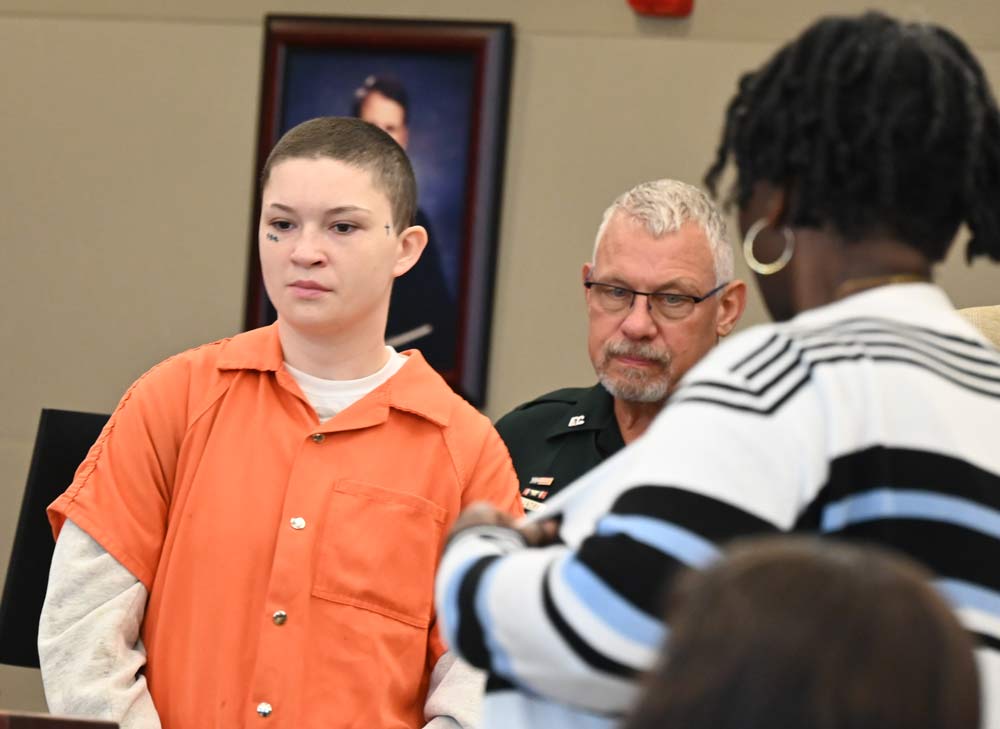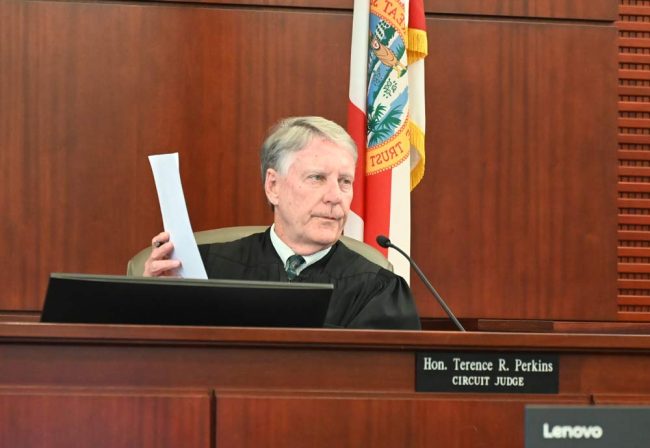
The brutality of the attack was underscored by the fact that half of Gabriella Alo’s violence was directed at a woman who’d rushed to the rescue of Alo’s first victim, an underage boy Alo and her older brother had been pummeling at Wickline Park in Flagler Beach the night of Jan. 11. (See: “Brother and Sister Face Several Felony Charges in Beating and Hit-and-Run at Wickline Park.”)
The attack shocked Flagler Beach, the more so because one of the victims, Kaitlin Dahme, who marked her 30th birthday Monday, is a well known member of the community: unusually for pre-trial hearings, Alo’s has drawn more than a dozen of Dahme’s supporters, friends and family every time, including today, when Alo tendered a plea.
She pleaded no contest to all five charges she faces, four of them felonies, one of them a first-degree felony–tampering with a witness while committing a second degree felony–and two of them second degree felonies: leaving the scene of a crash with an injury (Dahme’s, after Alo ran over her foot twice), and aggravated battery with a deadly weapon. She also faces a count of child abuse for beating up the underage boy, also a felony.
Alo had done her math. Though her criminal scoresheet’s points equate to a minimum of just over nine years in prison, when Circuit Judge Terence Perkins asked her if she knew how many years in prison she could potentially serve, when all her charges are added up, Alo immediately replied: 67.
She won’t serve anywhere near that much. She just turned 19 at the Flagler County jail, where she’s been held on $33,500 bond since Jan. 13. She has no prior adult criminal record and Perkins is not a sadist. But he’s not a softie, either, and victim impacts do have an impact on him: he’s seen Dahme’s support group in the courtroom, he’s heard her testify, he’s heard about Alo’s problems at the jail, and he may yet hear the underage boy–15 or 16 at the time of the attack– testify when he holds Alo’s sentencing hearing on Dec. 1.
For today’s plea hearing was just that: Perkins accepted Alo’s plea and noted that it’s an open plea. He also noted that Alo turned down the state’s offer of a deal: 15 years in prison, 10 years on probation. That will leave it up to Perkins to set the sentence, and to Assistant Public Defender Regina Nunally, who represents Alo, to argue for a “downward departure,” meaning a lower sentence than the state’s recommended minimum. It’ll be a challenge, though Nunnally’s reputation is garlanded in that sort of challenge: she can be a fierce, unrelenting advocate, especially if she has evidence to go on.
She told the court today that she does. She and Assistant State Attorney Tara Libby requested three hours for the Dec. 1 hearing, which is certain to include evidence from both sides, and testimony from both sides, including, very likely, that of Dahme. She last testified in February, her foot still in a cast, when she argued against granting Alo the sort of bail she could post.
Perkins held an unusually long colloquy with Alo today as he sought to ensure that she knew what she was doing. “Describe for me in your own words what you think you’re doing,” he asked her. Haltingly, she did, with Perkins providing a brief summary of what’s ahead, including his responsibility to hand down a “lawful and appropriate” sentence. She was tentative on law’s jargon. She was like an ace student when it came to her own criminal score and her awareness that the open plea would leave it up to the judge to decide her fate.
“I would have to hear evidence and make a finding that there was evidence to support a downward departure, right?” Perkins asked her. She summed her response, as she often did, though she also occasionally said “yes, sir.” (Some defendants are coached by their attorney to respond to every question with a “yes, sir,”or “yes, your honor,” which may be intended to be respectful but usually comes across as fawning and fake. Alo came across as more genuine in that respect. She has lost weight since she was jailed in January, her hair is cropped army style, but she still bears the same expression–a down-looking blankness of a quiet seethe that seems to leave no room for her middle name, which is Hope.)

After a number of questions, Perkins asked her: “Do you know why I’m asking you all these questions?”
“Not exactly,” she said. She sounded sincere: people in the audience, unfamiliar with Perkins, might have wondered likewise.
“My role at the time we’re taking this play,” Perkins explained, holding up the plea form Alo had signed, “is to determine whether your plea is knowing, that is, you know what you’re doing, and it’s voluntary. No one’s forcing you to do it. Okay? Is it knowing?” She said yes. “You understand what the agreement is in this case?” She said she did: Nunnally schools her clients, too, even those who don’t necessarily listen to her.
“Do you believe it to be in your best interest at this time?” Perkins asked Alo of the agreement.
“Yes, I do.” Depending on the outcome on Dec. 1, she will either rue those words or feel vindicated.
Meanwhile her 21-year-old brother Nicholas Alo is to be sentenced on charges stemming from the same incident on Oct. 13, a week after his 22nd birthday. He, too, tendered an open plea, though his charges add up to a maximum of 20 years in prison. Perkins wanted to sentence Gabriella in early November, close to her brother’s sentencing, but that proved impossible when a conspiracy of holidays, trial weeks and calendars already filled with hearings kept pushing the date toward the end of the year. That’s not usually a problem for defendants: it gives their families more time to visit at the local jail, though whenever Alo has been in court, she does not appear to have had anything like the support her victims have had.





























Leave a Reply